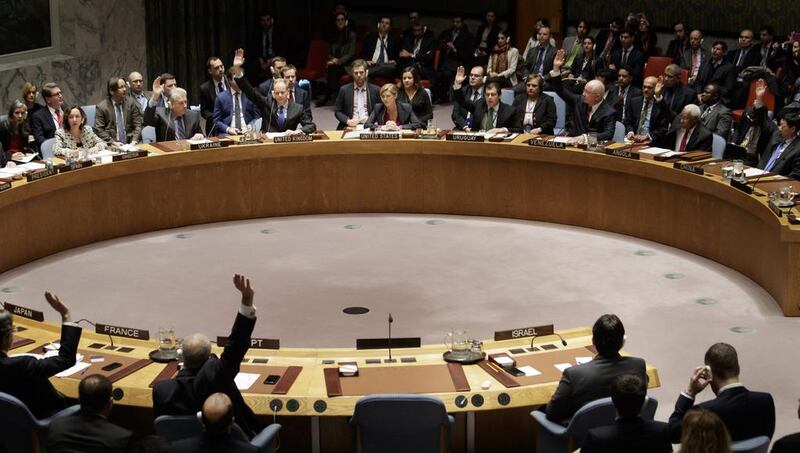NEW YORK // The UN Security Council yesterday demanded that Israel halt settlements on occupied Palestinian territory, in a resolution adopted after the United States refrained from vetoing the contentious measure.
The US instead abstained, allowing the measure to pass by a vote of 14 in favour in the 15-member council.
The resolution demands that “Israel immediately and completely cease all settlement activities in the occupied Palestinian territory, including East Jerusalem”.
It says that the Israeli settlements have “no legal validity” and are “dangerously imperilling the viability of the two-state solution” that envisions the co-existence of an independent Palestine alongside Israel.
It is the first resolution the Security Council has adopted on Israel and the Palestinians in nearly eight years.
The resolution was put forward for a vote by New Zealand, Malaysia, Venezuela and Senegal a day after Egypt withdrew it under pressure from Israel and US president-elect Donald Trump. Israel and Mr Trump had called on Washington to veto the measure.
Egypt submitted the draft resolution to the council on Wednesday but called for a delay of the vote just hours before it was to have been held on Thursday.
Israel asked Mr Trump to intervene after learning that Washington, in a reversal of its policy under president Barack Obama, would not veto the resolution, an Israeli official said.
Mr Trump, who had issued a statement demanding that Washington exercise its veto, called Egyptian president Abdel Fattah El Sisi.
The phone call “touched on the draft resolution on Israeli settlements”, the Egyptian presidency said yesterday.
“The two leaders agreed on the importance of giving the new administration a chance to deal comprehensively with all the aspects of the Palestinian cause to achieve a comprehensive settlement,” it said.
The Egyptian turnaround surprised many but follows repeated expressions of admiration for Mr Trump from Mr El Sisi, a former general who removed his Muslim Brotherhood predecessor after mass protests in 2013, leading Mr Obama to temporarily suspend military aid.
Mr Trump’s intervention and the Egyptian decision to postpone the vote appeared to have caught Washington off guard, with US secretary of state John Kerry cancelling plans for a speech laying out a vision for the Israeli-Palestinian peace process. Mr Kerry spoke to Egyptian foreign minister Sameh Shoukry on Wednesday and then, after the Egyptian decision, to Israeli premier Benjamin Netanyahu on Thursday.
Mr Obama’s administration has expressed mounting anger over the continued expansion of Jewish settlements in the occupied Palestinian West Bank, and speculation has grown that he could launch another initiative before leaving office next month.
A senior Security Council diplomat suggested that the motion could be buried indefinitely.
“There was a window of opportunity. Whether that window is still there is really not clear,” the western diplomat said.
Mr Trump, who campaigned on a promise to recognise Jerusalem as Israel’s capital, had said Washington should use its veto to block the resolution.
“As the United States has long maintained, peace between the Israelis and the Palestinians will only come through direct negotiations between the parties, and not through the imposition of terms by the United Nations,” he said.
Mr Trump has picked David Friedman to be the US ambassador to Israel. Mr Friedman, a hardliner, has said that Washington will not pressure Israel to curtail building settlements in the occupied West Bank.
Israeli settlements are viewed as a major stumbling block to peace efforts because they are built on land that the Palestinians see as part of their future state.
The UN maintains that the settlements are illegal, but UN officials have reported a surge in construction over the past months.
The Middle East peace process has been moribund since a US initiative to relaunch peace talks collapsed in April 2014.
France has announced plans to host an international conference on January 15 to try to restart talks based on the two-state solution.
* Agence France-Presse





